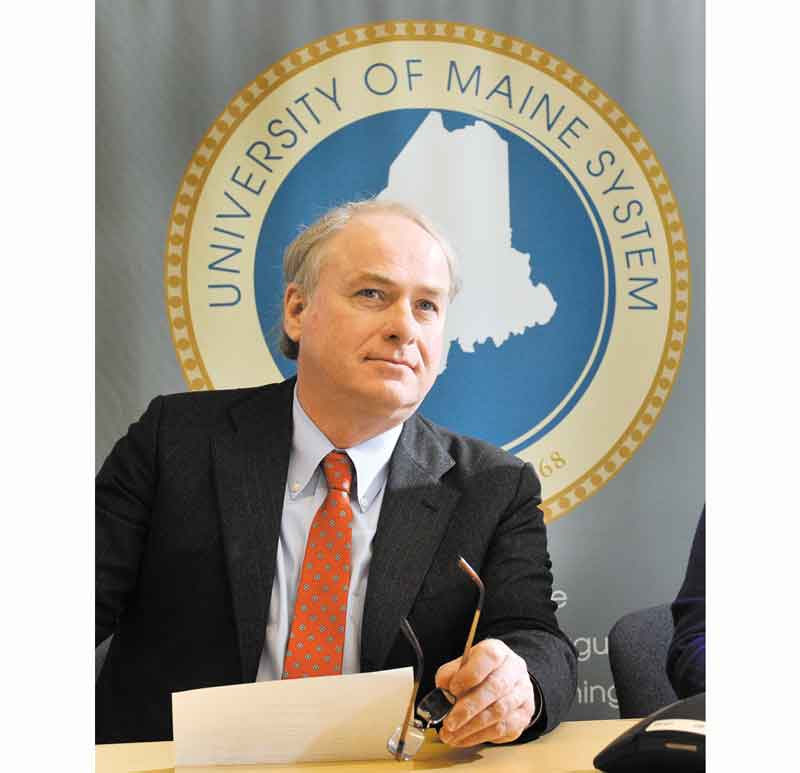The latest efforts to reshape the University of Maine System into a single entity – along with a plan to overhaul academic offerings systemwide – will be major topics this weekend at the system’s trustee meeting in Presque Isle.
UMS Chancellor James Page on Sunday will outline the administration’s progress in seeking a single accreditation for the entire system as part of its effort to have all seven campuses viewed as one university.
This comes as the system continues to consolidate numerous back-office functions, such as purchasing, IT, human relations and budgeting. The efforts are aimed at reducing overlap and saving money to close a deficit projected to reach $69 million by 2019. Page and the trustees have repeatedly said that maintaining seven campuses, each with its own administration, is financially unsustainable.
Maine’s four-year public campuses are now individually accredited by the New England Association of Schools and Colleges, or NEASC. Accreditation means that a university meets peer-reviewed standards for the quality of its programs and resources.
A single accreditation could help the UMaine System as it implements multi-campus degree programs or shifts to a unified budget process. Over the summer, Page and other administration officials met with the accrediting group’s commission, which later sent a letter saying they were “open in principle” to the idea.
The commission asked officials to submit a report next spring with more detail and a timeline, and noted that they would conduct “a comprehensive evaluation of the single institution once it has been established.”
Other four-year public university systems have single accreditations, including Penn State, which has one accreditation for 24 campuses.
One practical outcome of moving to a single accreditation became clear last week, when the Obama administration released a new “college scorecard” allowing would-be students to compare and contrast colleges using new data, including graduates’ average earnings and loan debt. Because Penn State has a single accreditation, all the campuses registered the same “salary after attending” data on the scorecard, making it impossible to compare data at individual campuses.
The trustees will also get an update on the early work of the academic review. Teams of faculty are analyzing each academic area, such as nursing and business, and evaluating all programs across the seven campuses to see what, if any, changes should be made – whether, for example, multiple campuses should offer the same degree, or should it only be offered at some campuses.
Recommendations already approved by Page include creating joint or system degrees for the following programs:
n History: merge to form one program, offered statewide.
n Business: one master’s in business adminstration program, offered through UMaine and the University of Southern Maine.
n Criminal Justice: one associate’s degree, common course numbers.
n Education: common master’s of education in instructional technology, offered through UMaine, USM and UMaine Farmington.
n Languages: statewide program for French and Spanish.
n Marine Sciences: a professional science master’s degree using so-called “4 +1” or four years undergraduate, one year master’s program.
n Nursing: fully aligned, with a unified nursing curriculum.
Page also approved plans to share courses and faculty, such as having all history faculty in the system apply for UMaine graduate faculty status and creating semester-long residencies at various campuses for the recreation and tourism program. He also approved a plan to make all lower-division mechanical and electrical engineering programs identical systemwide, easing the transition to graduate work at USM or UMaine.
The trustees will also vote on a proposed annual raise for employees not covered by union contracts, including senior administration officials.
The proposed increase for Page and campus presidents is a $750 one-time bonus and a 2 percent increase to their base salaries, effective next July. That would take Page’s salary from $277,500 to $283,050, and UMaine President Sue Hunter’s salary from $250,000 to $255,000.
Staff Writer Noel K. Gallagher can be contacted at 791-6387 or at:
Send questions/comments to the editors.



